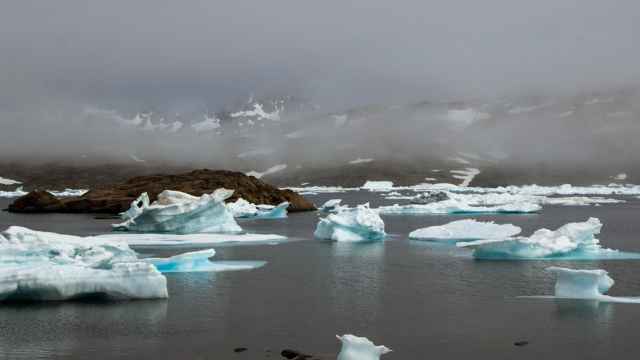Russia’s Marine Rescue Service have described an unprecedented salvage operation as "extremely difficult" after two oil barges ran aground in the Kara Sea. The incident has triggered a plea from environmental group, Bellona, to put a ban on transporting fuel during the Arctic winter months.
“There was a real threat of an ecological catastrophe comparable to the emergency near Norilsk,” stated Rosmorrechflot, the Federal Agency of Marine and Rivertransport. The rescue operation, which occurred on November 24 last year at the northwestern tip of the Vaygach island, has previously gone unreported.
Of the two rescued barges, one contained 7,000 tons of diesel fuel, while the other was loaded with 170 tons of kerosene. Fortunately, both barges were towed to safety by sea tug, the “Pak“ which is operated by the Lena River United Shipping Company based in Yakutia.
Sudden freeze-up
While the destination of the two barges rescued in the Kara Sea has not been disclosed, the supplies of fuel to Russia’s remote Arctic regions normally take place during autumn from departure ports such as Murmansk and Arkhangelsk. However, last fall saw a sudden freeze-up and quickly accumulating sea-ice on the Northern Sea Route, including the Kara Sea.
Vaygach, where the two oil barges ran aground, separates the archipelago of Novaya Zemlya from the mainland, most known for the Kara Gate, the western entrance to the Northern Sea Route between Europe and Asia.
When the distress call was made, the tug with the barges was battling stormy winds, waves, drifting ice and polar darkness, said Rosmorrechflot. Fortunately, the salvage tug “Beisug” was at the Kara Gate, and able to reach the site of emergency in just 35 minutes.
By that time, the two oil barges MN-4001 and MN-4002 were already on the rocks. Two other rescue ships were also sent to the site with additional equipment, as well as a support vessel which was dispatched from Murmansk.
The rescuers reportedly had a hard time cracking the ice that had built up on the deck of the barges, with the ice having built up to around 30-50 cm, according to information published by Russia’s Marine Rescue Service last week.
Two months in shadow
It is unclear why it took nearly two months for details about the accident to be made public, although one reason could be that the rescued barges only arrived last week at port in Severodvinsk in the White Sea, as reported by local newspaper Severny Rabotchy, ensuring that any dangers of a potential spill are now over.
The rescue operation was very difficult and the crew of the salvage vessels were working around the clock to avoid a major oil spill in the fragile Arctic marine environment. Pulling the barges off the rocks was considered too unsafe, and would have led to massive damage done to the barge hulls, as well as a guaranteed oil spill, the rescue service said.
Work was further complicated by limited depths, windy weather, waves, shifting ice and temperatures down to minus 20 degrees Celsius. The rescue workers were forced to manually break the ice to gain access to hatches and other structures, in order to reduce the weight of the barges.
Additionally, diving inspections revealed that the ballast tanks on both barges were pierced. Two tankers came to the site and about 5,000 tons of the diesel fuel was reloaded.
The first barge was removed from the rocks during December, soon followed by the other.
After additional diving inspections, a plan was made to tow the barges to a safe port. The towing operation took place in “extremely difficult ice conditions”, the barge got “repeatedly stuck” in dense ice that in some places was up to one meter thick. Additionally, the crew had to tackle ice building up on deck through the eastern part of the Barents Sea and the White Sea to Severodvinsk near Arkhangelsk.
It was only thanks to the competency and well-coordinated actions by the marine rescuers, that an environmental disaster in Russia’s Arctic zone was narrowly avoided, the emergency services concluded.
Deeply worried
Sigurd Enge, an expert on Arctic shipping and marine environment with the Bellona Foundation in Oslo, is deeply worried about what happened.
“It is only luck that this didn’t end in a disastrous oil spill,” he said in a phone interview with the Barents Observer.
“It clearly shows that the Northern Sea Route is not ready for year-round sailings. Towing barges with fuel oil are seriously jeopardizing the Arctic environment. We can’t base emergency preparedness on luck,” Sigurd Enge said.
“Icing on vessels happens very quickly,” he explained. “In worst conditions, sea spray icing occurs when freezing cold wave-generated spray comes in contact with any structure on the boat.”
“Seawater can freeze to ice on the deck within seconds,” he noted.
In December 2020, it is believed that ice building up on deck led to the sinking of Russian fishing vessel “Onega” near Novaya Zemlya in the eastern Barents Sea, with only two of the 19 crew members on board having been rescued.
Additionally, Sigurd Enge said that the danger of icing makes towing and emergency navigation especially hard. “You can’t sail against the wind. That will create even more spray that freezes on the vessel.”
“We in Bellona strongly recommend imposing a ban on towing barges with fuel oil in icy waters, especially during polar night,” Sigurd Enge said.
“It is simply too risky.”
A Message from The Moscow Times:
Dear readers,
We are facing unprecedented challenges. Russia's Prosecutor General's Office has designated The Moscow Times as an "undesirable" organization, criminalizing our work and putting our staff at risk of prosecution. This follows our earlier unjust labeling as a "foreign agent."
These actions are direct attempts to silence independent journalism in Russia. The authorities claim our work "discredits the decisions of the Russian leadership." We see things differently: we strive to provide accurate, unbiased reporting on Russia.
We, the journalists of The Moscow Times, refuse to be silenced. But to continue our work, we need your help.
Your support, no matter how small, makes a world of difference. If you can, please support us monthly starting from just $2. It's quick to set up, and every contribution makes a significant impact.
By supporting The Moscow Times, you're defending open, independent journalism in the face of repression. Thank you for standing with us.
Remind me later.






